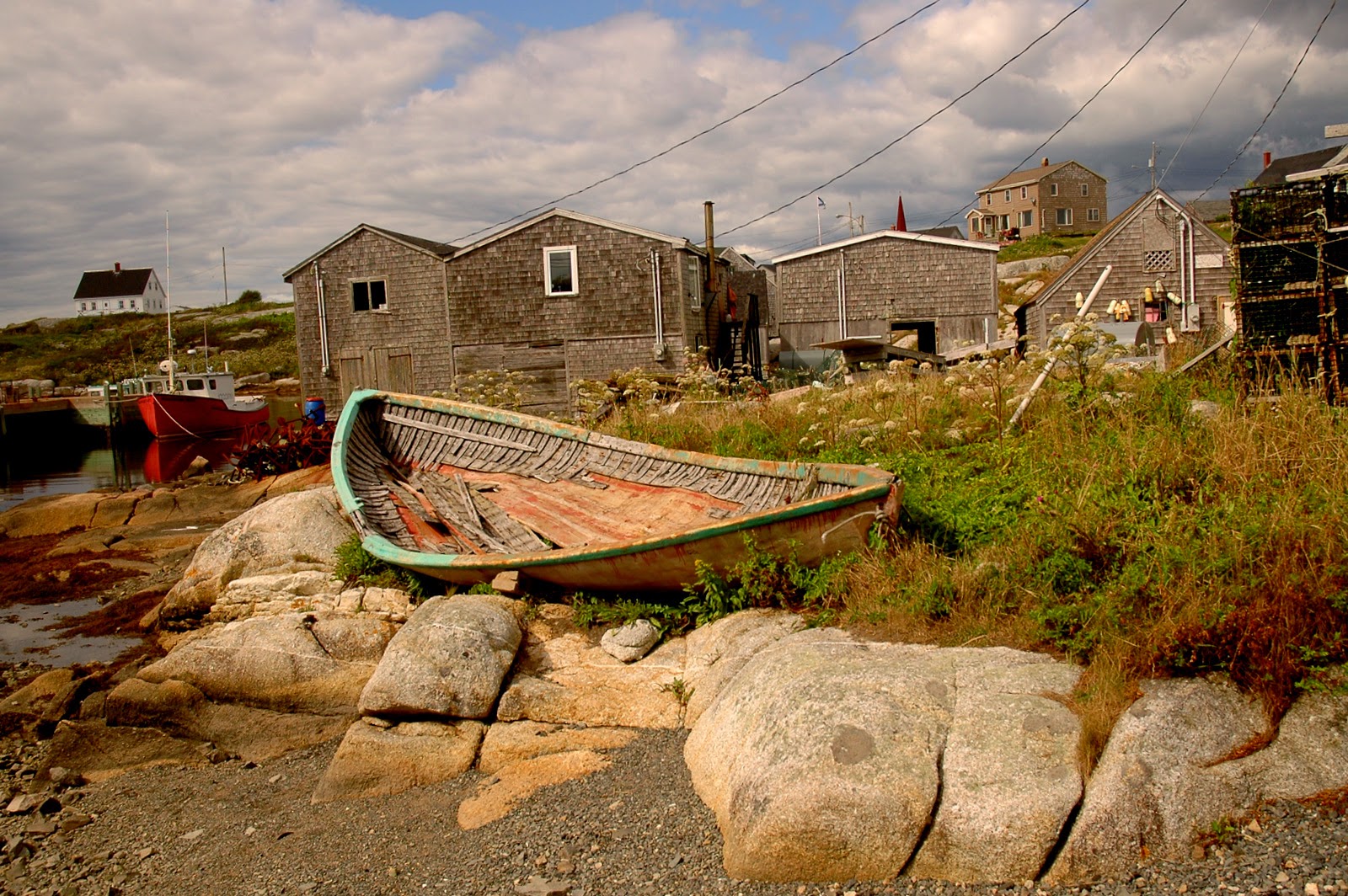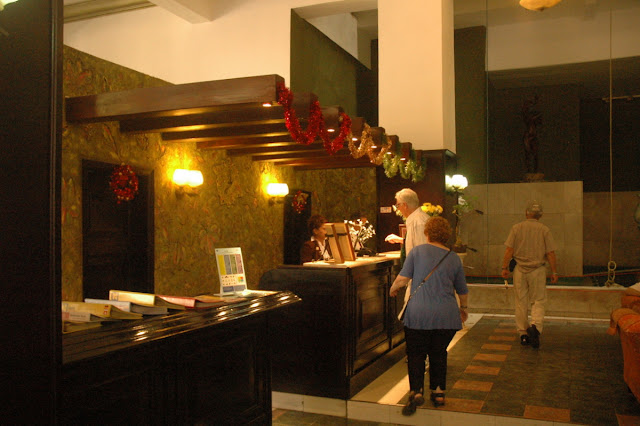In August I read Gawande when in Peggy's Cove and posted about his book Complications! Honestly, I did not know Gawande was giving the Reith Lectures.
Peggy's
Cove: Charm & Complications!
What a charming
place: Peggy's Cove of Halifax.
The Cockroach Catcher
was finishing reading the book Complications and such charming old landscape
reminds him of the old traditional medical training he received and how some
doctors still do. Like the author of this book.
The book reads more
like a collection of blog posts and in fact it was. Yet it was real and
touching. Sometimes it was brunt and brutal. and after all doctors are as human
as anyone. Complications includes those doctors themselves may
suffer: mental illness and alcoholism as well as the serious cardiac condition
of the author's young son.
We, doctors make
mistakes and please we must be allowed to sort them out without affecting
career or worst, future medical behaviour.
A great book for
doctors in particular and when on holiday in a charming place.
(Metropolitan Books, 288 pages, $24), a collection of 14 pieces, some of which were originally published in The New Yorker and Slate magazines, Gawande uses real-life scenarios – a burned-out doctor who refuses to quit; a terminal patient who opts for risky surgery, with fatal results – to explore the larger ethical issues that underlie medicine. He asks: How much input should a patient have? How can young doctors gain hands-on experience without endangering lives? And how responsible are these doctors for their mistakes?
While “Complications” is full of tragic errors and near misses, the book is not intended to be an expose. Rather, Gawande asserts, it is meant to deepen our understanding of the intricacies of medicine. “In most medical writing, the doctor is either a hero or a villain,” he says, with an edge in his voice. “What I am trying to do is push beyond that and show how ordinary doctors are – and at the same time show that what they can do is extraordinary.”
John Freeman, Copyright (c) 2002 The Denver
Quotes
- ‘There have now been many studies of elite performers – international violinists, chess grand masters, professional ice-skaters, mathematicians, and so forth – and the biggest difference… is the cumulative amount of deliberate practice they’ve had.’
- ‘We have long faced a conflict between the imperative to give patients the best possible care and the need to provide novices with experience. Residencies attempt to mitigate potential harm through supervision and graduated responsibility. And there is reason to think patients actually benefit from teaching. Studies generally find teaching hospitals have better outcomes than non-teaching hospitals. Residents may be amateurs, but having them around checking on patients, asking questions, and keeping faculty on their toes seem to help. But there is still getting around those first few unsteady times a young physician tries to put in a central line, remove a breast cancer, or sew together two segments of a colon… the ward services and clinics where residents have the most responsibility are populated by the poor, the uninsured, the drunk, and the demented… By traditional ethics and public insistence (not to mention court rulings), a patient’s right to the best care possible must trump the objective of training novices. We want perfection without practice. Yet everyone is harmed if no one is trained for the future. So learning is hidden behind drapes and anesthesia and the elisions of language.’
- ‘There is one place, however, where doctors can talk candidly about their mistakes, if not with patients, then at least with one another. It is called the Morbidity and Mortality Conference – or, more simply, M+M – and it takes place, usually once a week, at nearly every academic hospital in the country. This institution survives because laws protecting its proceedings from legal discovery have stayed on the books in most states, despite frequent challenges.’
Quotes
- ‘There have now been many studies of elite performers – international violinists, chess grand masters, professional ice-skaters, mathematicians, and so forth – and the biggest difference… is the cumulative amount of deliberate practice they’ve had.’
- ‘We have long faced a conflict between the imperative to give patients the best possible care and the need to provide novices with experience. Residencies attempt to mitigate potential harm through supervision and graduated responsibility. And there is reason to think patients actually benefit from teaching. Studies generally find teaching hospitals have better outcomes than non-teaching hospitals. Residents may be amateurs, but having them around checking on patients, asking questions, and keeping faculty on their toes seem to help. But there is still getting around those first few unsteady times a young physician tries to put in a central line, remove a breast cancer, or sew together two segments of a colon… the ward services and clinics where residents have the most responsibility are populated by the poor, the uninsured, the drunk, and the demented… By traditional ethics and public insistence (not to mention court rulings), a patient’s right to the best care possible must trump the objective of training novices. We want perfection without practice. Yet everyone is harmed if no one is trained for the future. So learning is hidden behind drapes and anesthesia and the elisions of language.’
- ‘There is one place, however, where doctors can talk candidly about their mistakes, if not with patients, then at least with one another. It is called the Morbidity and Mortality Conference – or, more simply, M+M – and it takes place, usually once a week, at nearly every academic hospital in the country. This institution survives because laws protecting its proceedings from legal discovery have stayed on the books in most states, despite frequent challenges.’
Latest Gawande Book:
In one of the most moving passages in the book, Gawande’s father, in hospice, rises from his wheelchair to hear his son lecture at their hometown university. “I was almost overcome just witnessing it,” Gawande writes.
........Gawande offers no manifesto, no checklist, for a better end of life. Rather, he profiles professionals who have challenged the status quo, including Bill Thomas and other geriatricians, palliative-care specialists, and hospice workers. Particularly inspiring are the stories of patients who made hard decisions about balancing their desire to live longer with their desire to live better. These include Gawande’s daughter’s piano teacher, who gave lessons until the last month of her life, and Gawande’s father, also a surgeon, who continued work on a school he founded in India
He’s awed not only by his father’s strength, but by the hospice care that helped the dying man articulate what mattered most to him, and to do it. Gawande thinks, as he watches his proud father climb the bleachers, “Here is what a different kind of care — a different kind of medicine — makes possible.”
What would lawyers say about M + M:
- ‘There is one place, however, where doctors can talk candidly about their mistakes, if not with patients, then at least with one another. It is called the Morbidity and Mortality Conference – or, more simply, M+M – and it takes place, usually once a week, at nearly every academic hospital in the country. This institution survives because laws protecting its proceedings from legal discovery have stayed on the books in most states, despite frequent challenges.’
>>>See also Dr No: We Have No Black Boxes
>>>See also Dr No: We Have No Black Boxes
Abetternhs's Blog What are we afraid of?
August 27 2014:
What a charming place: Peggy's Cove of Halifax.
The Cockroach Catcher was finishing reading the book Complications and such charming old landscape reminds him of the old traditional medical training he received and how some doctors still do. Like the author of this book.
The book reads more like a collection of blog posts and in fact it was. Yet it was real and touching. Sometimes it was brunt and brutal. and after all doctors are as human as anyone. Complications includes those doctors themselves may suffer: mental illness and alcoholism as well as the serious cardiac condition of the author's young son.
We, doctors make mistakes and please we must be allowed to sort them out without affecting career or worst, future medical behaviour.
A great book for doctors in particular and when on holiday in a charming place.
All photos©2014 Am Ang Zhang
(Metropolitan Books, 288 pages, $24), a collection of 14 pieces, some of which were originally published in The New Yorker and Slate magazines, Gawande uses real-life scenarios – a burned-out doctor who refuses to quit; a terminal patient who opts for risky surgery, with fatal results – to explore the larger ethical issues that underlie medicine. He asks: How much input should a patient have? How can young doctors gain hands-on experience without endangering lives? And how responsible are these doctors for their mistakes?
While “Complications” is full of tragic errors and near misses, the book is not intended to be an expose. Rather, Gawande asserts, it is meant to deepen our understanding of the intricacies of medicine. “In most medical writing, the doctor is either a hero or a villain,” he says, with an edge in his voice. “What I am trying to do is push beyond that and show how ordinary doctors are – and at the same time show that what they can do is extraordinary.”
John Freeman, Copyright (c) 2002 The Denver
Quotes
- ‘There have now been many studies of elite performers – international violinists, chess grand masters, professional ice-skaters, mathematicians, and so forth – and the biggest difference… is the cumulative amount of deliberate practice they’ve had.’
- ‘We have long faced a conflict between the imperative to give patients the best possible care and the need to provide novices with experience. Residencies attempt to mitigate potential harm through supervision and graduated responsibility. And there is reason to think patients actually benefit from teaching. Studies generally find teaching hospitals have better outcomes than non-teaching hospitals. Residents may be amateurs, but having them around checking on patients, asking questions, and keeping faculty on their toes seem to help. But there is still getting around those first few unsteady times a young physician tries to put in a central line, remove a breast cancer, or sew together two segments of a colon… the ward services and clinics where residents have the most responsibility are populated by the poor, the uninsured, the drunk, and the demented… By traditional ethics and public insistence (not to mention court rulings), a patient’s right to the best care possible must trump the objective of training novices. We want perfection without practice. Yet everyone is harmed if no one is trained for the future. So learning is hidden behind drapes and anesthesia and the elisions of language.’
- ‘There is one place, however, where doctors can talk candidly about their mistakes, if not with patients, then at least with one another. It is called the Morbidity and Mortality Conference – or, more simply, M+M – and it takes place, usually once a week, at nearly every academic hospital in the country. This institution survives because laws protecting its proceedings from legal discovery have stayed on the books in most states, despite frequent challenges.’
















































